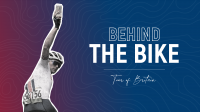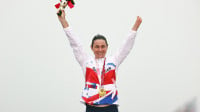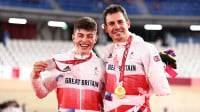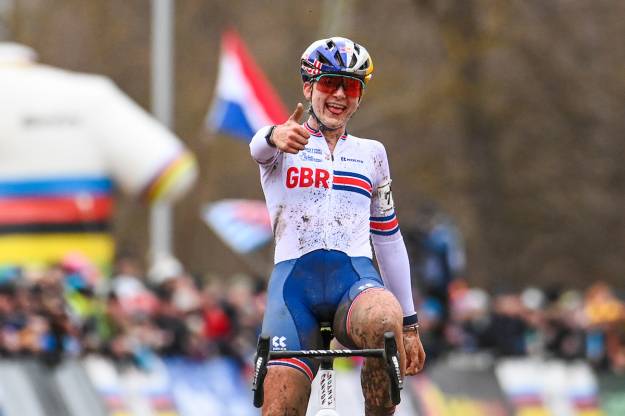| |
Taking place on 28 July and starting at 10am, the Men’s Road Race is one of the first events of London 2012, with Mark Cavendish, fresh from an emphatic victory on the Champs Elysee, carrying the hopes of winning the first gold medal for Great Britain.
Dave Brailsford speaks on Mark Cavendish and the Olympic Men's Road Race from British Cycling on Vimeo.
Cavendish will be supported in his efforts for gold by Bradley Wiggins, Chris Froome, David Millar and Ian Stannard and will face a testing course that starts on The Mall before leaving London for nine laps of a challenging loop in Surrey, taking in the key Box Hill climb nine times before returning to London for a dramatic finish on The Mall.
The Team
Cavendish and the team approach the Olympic Road Race after a phenomenally successful year on the road. Wearing the rainbow bands of the world champion, Cavendish himself has taken three stages of the 2012 Tour de France, three stages of the Giro d ‘Italia, two stages of the Tour of Qatar and overall win in the Ster ZLM Toer.
 The psychological edge of having the world champion on the team is something that Performance Director Dave Brailsford is keen to point out; “To have the World Champion on the British team, that is a big call, it makes a big difference on the team and all the riders want to get behind him and support him.
The psychological edge of having the world champion on the team is something that Performance Director Dave Brailsford is keen to point out; “To have the World Champion on the British team, that is a big call, it makes a big difference on the team and all the riders want to get behind him and support him.
“I think the whole team is going in there with real high ambition and we just want to make sure we go in there with everything right, ready to race with the backroom staff knowing exactly what we’re doing and there’s no miscommunication there’s no misalignment of thinking.”
However the particular demands of the London 2012 course, with its multiple climbs of Box Hill, have prompted Cavendish to tailor both his training and his physique to the task in hand, losing weight and coming into the road race straight from three weeks of action supporting Bradley Wiggins in the Tour de France.
 Cavendish’s performance in the Pyrenean stage over the Mur de Peguere showed the progress he has made as a climber and completing the Tour de France is key for the rider’s conditioning. However Performance Director Dave Brailsford is mindful of the fact that it’s critical that Cavendish goes into what will be a tough race ‘Box’ fresh:
Cavendish’s performance in the Pyrenean stage over the Mur de Peguere showed the progress he has made as a climber and completing the Tour de France is key for the rider’s conditioning. However Performance Director Dave Brailsford is mindful of the fact that it’s critical that Cavendish goes into what will be a tough race ‘Box’ fresh:
“You want to hit the road race fresh, mentally and physically fresh and if that’s the case and he maintains and builds on the current form he has then he’ll certainly be competitive.
“I think with Mark we’re learning all the time in terms of understanding his physiology and having him in the team this year it’s much easier having him at close quarters and I think he certainly benefits from racing, he goes well off racing and so the more racing that he can do the better it is. But like I say just keeping a close watch on him and making sure he is fresh is going to be key.”
 The team behind Cavendish also come into the Road Race on fantastic form; having Great Britain’s first ever Tour winner working for you speaks for itself. Wiggins played a critical role in Cavendish’s 2011 world championships victory in Copenhagen, his incredible win in stage 18 of the Tour and his final, exultant win on the Champs Elysee and will be there again, paying back Cavendish for his domestique duties during the Tour de France.
The team behind Cavendish also come into the Road Race on fantastic form; having Great Britain’s first ever Tour winner working for you speaks for itself. Wiggins played a critical role in Cavendish’s 2011 world championships victory in Copenhagen, his incredible win in stage 18 of the Tour and his final, exultant win on the Champs Elysee and will be there again, paying back Cavendish for his domestique duties during the Tour de France.
David Millar was also part of the winning team in Copenhagen and comes into the Olympic Road Race on the back of a fine stage victory in the Tour de France. Millar was assigned the role of team captain in Copenhagen and did a superb job of marshalling the squad.
 Like Wiggins, Chris Froome’s form needs no introduction – finishing second in the Tour de France after three weeks as Wiggins’ lieutenant, winning a stage in the process and looking ever threatening when the roads turned skyward.
Like Wiggins, Chris Froome’s form needs no introduction – finishing second in the Tour de France after three weeks as Wiggins’ lieutenant, winning a stage in the process and looking ever threatening when the roads turned skyward.
Ian Stannard played a critical role in Cavendish’s success in Copenhagen too; along with Geraint Thomas, it was Stannard who shepherded Cavendish through the melee of the final half lap after being instrumental in a heroic team effort throughout the race. After winning the British national road title in July, Stannard’s final preparations came at the Tour of Poland, where the rider came close to winning a stage himself, whilst supporting Team Sky comrade Ben Swift to two stage victories.
Tactically however, the Olympic Road Race will be a more difficult race to manage than the worlds – with a much reduced team of five riders, Great Britain’s (and other nations’) ability to govern the race as they did in Copenhagen, will be much reduced, as Performance Director Dave Brailsford explained in a recent interview: “There’s teams of five, teams of four, teams of three and two and one, small teams with favourites for the race, it’s a strange one, a funny mix and we’ll have to see how the race pans out.
“It could be one of those races where it just goes full gas, very aggressive race or it could be conservative, but we’ll do our best that’s for sure, to try and make it a sprint finish.”
The course
 The race will begin on The Mall, before the riders head south-west through the city. They will then cross the Thames at Putney Bridge and continue out through Richmond Park and past Hampton Court Palace.
The race will begin on The Mall, before the riders head south-west through the city. They will then cross the Thames at Putney Bridge and continue out through Richmond Park and past Hampton Court Palace.
The Surrey section of the course incorporates several circuits of a short, challenging loop around Box Hill (nine for the men’s Road Race, two loops for the women’s equivalent), before the riders head north through Leatherhead, Esher, Kingston, Richmond Park and back to The Mall for a dramatic finish.
The ticketed Box Hill section of the course is clearly the critical sector of the race. In the early stages the North Downs beauty spot may be the point at which the strong teams may attempt to break the race and sift out the lesser competitors.
As the race progresses fatigue will take its toll and the sprinters’ ability to stay in contention over the hill will become critical. In such an unpredictable race, Box Hill may be a point, on the final lap, where a team without a pure sprinter may attempt to launch a late break, in the manner of breakaway wins in one day classics such as Milan San Remo.
The opposition

Taking into account the dynamic of the Olympic Road Race and the fact that much of the opposition’s form can only be viewed in terms of their performances in a trade team context, picking out likely key rivals to Cavendish comes down to indentifying those individuals who have shown the ability to sprint, climb and hold their own in a race where team dominance his tough.
Peter Sagan is one name which rises to the top in this context. Described by some as a ‘ninja’, Sagan’s ability to read the final chaotic moments of a race and emerge victorious has won much admiration in 2012. The Slovakian, riding for trade team Liquigas Cannondale for 2012, has notched up an impressive palmares this year, starting with the points jersey and a stage win in Oman, stage victories in Three Days de Panne and Tirreno Adriatico followed by five stages and the points jersey in the Tour of California and four stages and the points classification in Tour de Suisse. Sagan’s final approach to London 2012 saw him notch up three stage victories in the Tour de France and demonstrate excellent climbing ability on stage 14 from Limoux to Foix. However, Sagan enters the race with no team around him, a key factor in Cavendish’s favour.
Of the pure sprinters Germany’s Andre Greipel is perhaps the form man, coming into the Road Race after multiple stage wins in the Tour de France and coping well in the hillier stages. Greipel will be at the head of a five man team comprising John Degenkolb, Bert Grabsch, Tony Martin and Marcel Sieberg and could be a major threat if it comes to a gallop on The Mall.
Belgium’s Philippe Gilbert is a man with an excellent reputation in one day races, possessed of the ability to be in the mix for a sprint when the topography has weeded out the heavyweights. However, Gilbert’s 2012 form has below the stellar levels of 2011, which saw eight one-day wins, a Tour de France stage, his national title and the overall UCI World Tour title. Gilbert’s countryman Tom Boonen is also one to watch – after a stunning start to 2012, winning Paris-Roubaix, Tour of Flanders and Gent-Wevelgem, Boonen has slipped off the radar mid season. Despite a crash in the Tour of Poland resulting in a broken rib, Boonen continues to train for the showdown on The Mall.
Norway too poses a strong threat, with Edvald Boassen Hagen heading the charge, supported by Alexander Kristoff, Vegard Stake Langen and Lars Petter Nordhaug. ‘EBH’ has had a stellar season in 2012, winning his national title, the Tour of Norway and bagging stage wins in the Criterium de Dauphine and Tirreno-Adriatico. Thor Hushovd is absent from the squad, the former road world champion sidelined by a season-long illness.
Australia’s Matt Goss has shown great form leading up to the Games and is backed by an experienced team consisting of Stuart O’Grady, Cadel Evans, Michael Rogers and Simon Gerrans who are capable of delivering the Green Edge rider to the Mall in his national colours. Goss has the advantage that his national team takes it’s backbone from Green Edge, meaning that the Australians will be well versed in riding as a unit.
If the race doesn’t come down to a bunch sprint then there is a swathe of other contenders who suddenly come into the mix. Amongst them 2008 Olympic champions Spain have two riders who can spring nasty surprises on the peloton – Luis Leon Sanchez and Alejandro Valverde, both hot from stage victory in the Tour de France. The Spanish threat did however take a double blow during the Tour, with both reigning Olympic champion Samuel Sanchez and José Joaquín Rojas’ both sidelined through injury.
Denmark’s Lars Bak, supported by Nicki Sorensen is also a threat, winning a stage of the Giro in 2012 riding in Greipel’s Lotto Belisol team. Lars Boom of the Netherlands is always a man to watch and is joined by a strong five man team; Robert Gesink, Sebastian Langeveld, Niki Terpstra and Lieuwe Westra.
Finally, one man who should never be ruled out of a one-day race is Switzerland’s Fabien Cancellara. ‘Spartacus’ is however targeting Time Trial glory in London but will head up his national team alongside Michael Albasini. However, Cancellara’s ability to make late, lone breaks should never be ignored.
How to watch
The race will be broadcast live on the BBC. Check out http://www.bbc.co.uk/sport/olympics/2012/sports/cycling-road/events/mens-road-race for more details.









